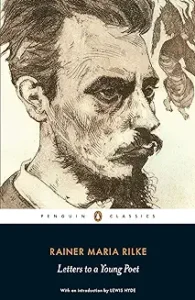Letters to a Young Poet by Rainer Maria Rilke 1904
Rainer Maria Rilke, a Bohemian-Austrian poet (b. 1875, d.1926), wrote ten letters to Franz Xavier Kappus, a military cadet and aspiring poet, between 1902 and 1908. Kappus had sought Rilke’s opinion of his poetry and had access to him because Rilke had been a student at the same military school as Kappus. The letters, written from Paris, Bremen, Pisa, Rome, and Furoborg, Sweden, were collected by Kappus and published in 1929 after Rilke’s death. While Kappus failed to achieve literary fame, Rilke’s letters have become a cult classic for students of literature.
In these ten letters, Rilke avoids making comments on the poems Kappus had sent to him and instead, offers suggestions about how to live and how to write. Rilke urges him to avoid seeking the opinion of others, especially literary critics and to embrace solitude observiing that it is only in solitude that the authentic self can emerge and engage in the struggles with life that lead to meaningful writing. Rilke urges Kappus to seek nature and avoid society, embrace sexuality and desire and channel them into creative energy, and above all be patient, love the questions, don’t reach for the answers, and accept the mystery of life. Rilke wrote that we are alone moving into a future that is standing still and awaiting us.
Along the way, Rilke praises the writing of a Danish author, Jens Peter Jacobsen and the Bible as well as Rodin’s sculpture He also mentions Edgar Alan Poe in passing.
These letters are the epitome of the Romantic period—solitude, spiritual beauty, mystery—and feel like they are 100+ years old in many ways. But they continue to also feel true and provide good advice for the aspiring poet.



